Human Resource Management For a Service Industry | Assignment
VerifiedAdded on 2021/01/01
|13
|3318
|389
AI Summary
Contribute Materials
Your contribution can guide someone’s learning journey. Share your
documents today.
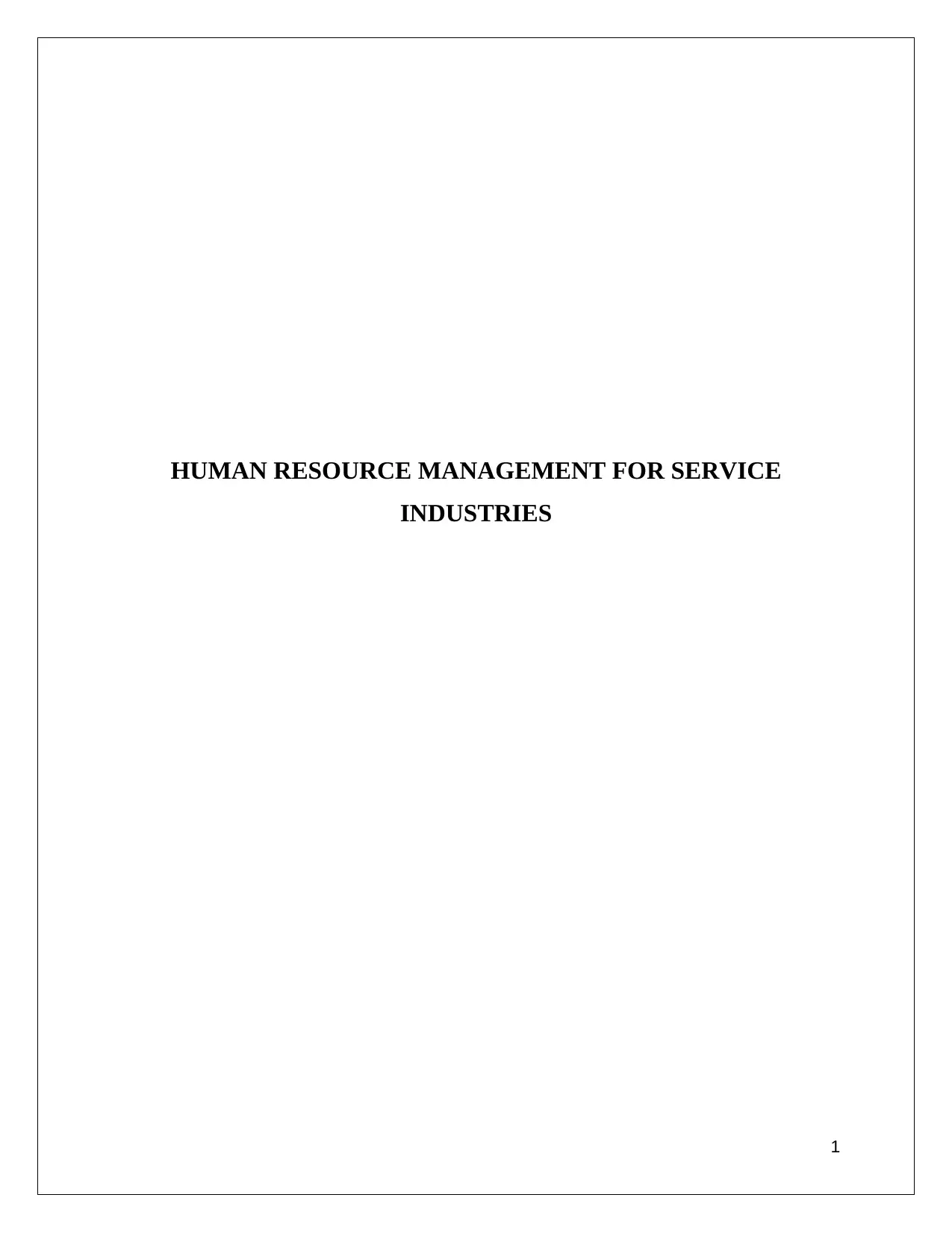
HUMAN RESOURCE MANAGEMENT FOR SERVICE
INDUSTRIES
1
INDUSTRIES
1
Secure Best Marks with AI Grader
Need help grading? Try our AI Grader for instant feedback on your assignments.
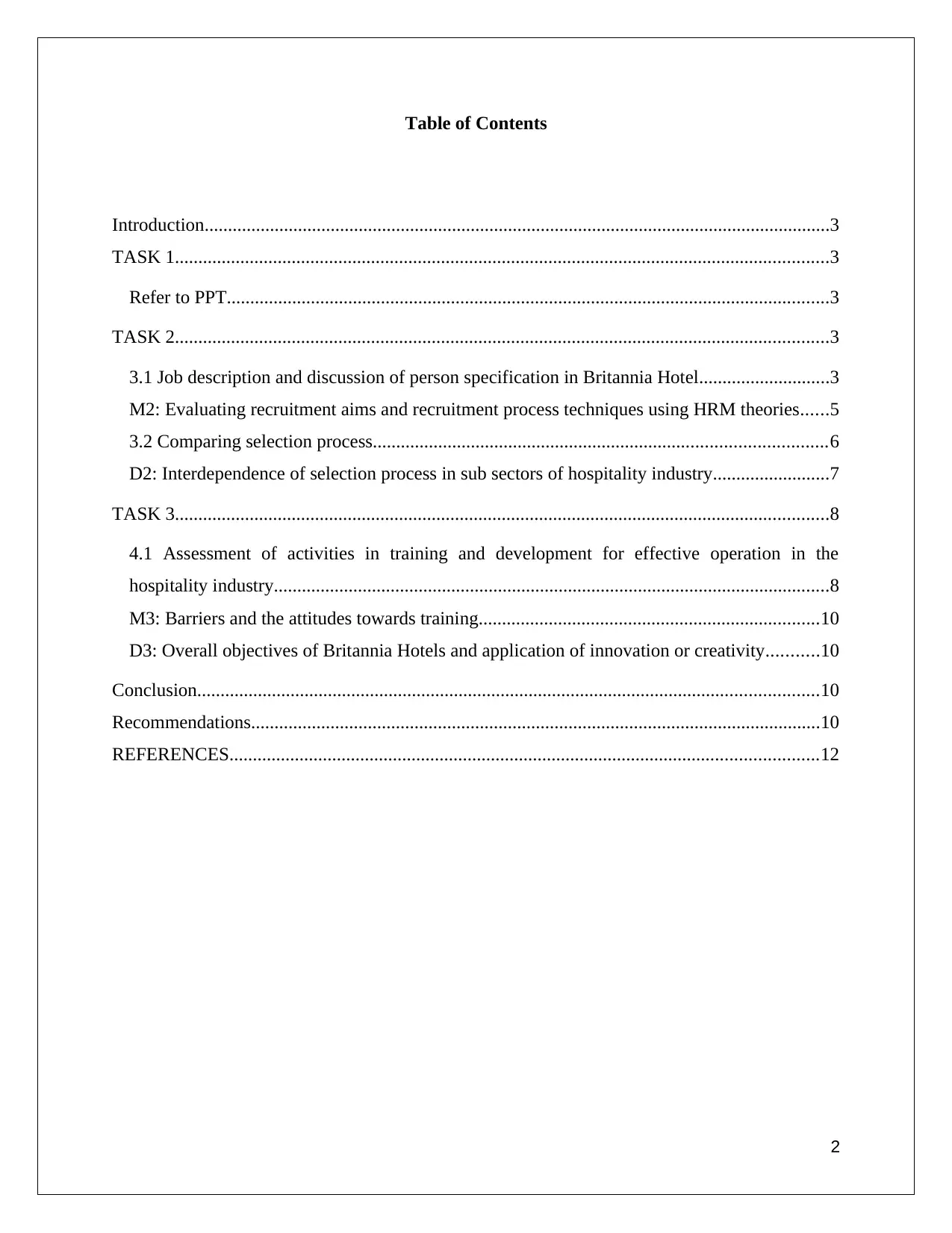
Table of Contents
Introduction......................................................................................................................................3
TASK 1............................................................................................................................................3
Refer to PPT.................................................................................................................................3
TASK 2............................................................................................................................................3
3.1 Job description and discussion of person specification in Britannia Hotel............................3
M2: Evaluating recruitment aims and recruitment process techniques using HRM theories......5
3.2 Comparing selection process.................................................................................................6
D2: Interdependence of selection process in sub sectors of hospitality industry.........................7
TASK 3............................................................................................................................................8
4.1 Assessment of activities in training and development for effective operation in the
hospitality industry.......................................................................................................................8
M3: Barriers and the attitudes towards training.........................................................................10
D3: Overall objectives of Britannia Hotels and application of innovation or creativity...........10
Conclusion.....................................................................................................................................10
Recommendations..........................................................................................................................10
REFERENCES..............................................................................................................................12
2
Introduction......................................................................................................................................3
TASK 1............................................................................................................................................3
Refer to PPT.................................................................................................................................3
TASK 2............................................................................................................................................3
3.1 Job description and discussion of person specification in Britannia Hotel............................3
M2: Evaluating recruitment aims and recruitment process techniques using HRM theories......5
3.2 Comparing selection process.................................................................................................6
D2: Interdependence of selection process in sub sectors of hospitality industry.........................7
TASK 3............................................................................................................................................8
4.1 Assessment of activities in training and development for effective operation in the
hospitality industry.......................................................................................................................8
M3: Barriers and the attitudes towards training.........................................................................10
D3: Overall objectives of Britannia Hotels and application of innovation or creativity...........10
Conclusion.....................................................................................................................................10
Recommendations..........................................................................................................................10
REFERENCES..............................................................................................................................12
2
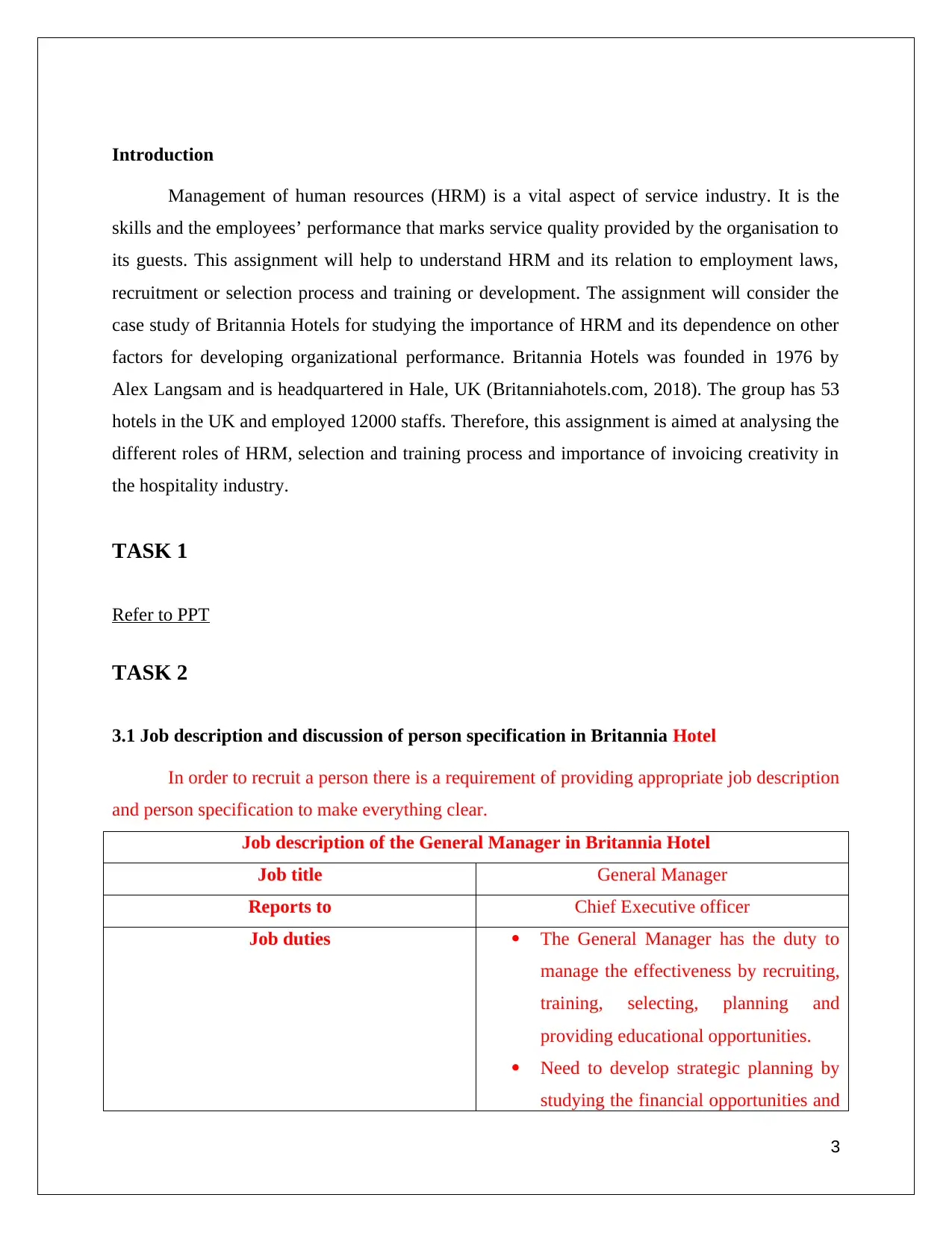
Introduction
Management of human resources (HRM) is a vital aspect of service industry. It is the
skills and the employees’ performance that marks service quality provided by the organisation to
its guests. This assignment will help to understand HRM and its relation to employment laws,
recruitment or selection process and training or development. The assignment will consider the
case study of Britannia Hotels for studying the importance of HRM and its dependence on other
factors for developing organizational performance. Britannia Hotels was founded in 1976 by
Alex Langsam and is headquartered in Hale, UK (Britanniahotels.com, 2018). The group has 53
hotels in the UK and employed 12000 staffs. Therefore, this assignment is aimed at analysing the
different roles of HRM, selection and training process and importance of invoicing creativity in
the hospitality industry.
TASK 1
Refer to PPT
TASK 2
3.1 Job description and discussion of person specification in Britannia Hotel
In order to recruit a person there is a requirement of providing appropriate job description
and person specification to make everything clear.
Job description of the General Manager in Britannia Hotel
Job title General Manager
Reports to Chief Executive officer
Job duties The General Manager has the duty to
manage the effectiveness by recruiting,
training, selecting, planning and
providing educational opportunities.
Need to develop strategic planning by
studying the financial opportunities and
3
Management of human resources (HRM) is a vital aspect of service industry. It is the
skills and the employees’ performance that marks service quality provided by the organisation to
its guests. This assignment will help to understand HRM and its relation to employment laws,
recruitment or selection process and training or development. The assignment will consider the
case study of Britannia Hotels for studying the importance of HRM and its dependence on other
factors for developing organizational performance. Britannia Hotels was founded in 1976 by
Alex Langsam and is headquartered in Hale, UK (Britanniahotels.com, 2018). The group has 53
hotels in the UK and employed 12000 staffs. Therefore, this assignment is aimed at analysing the
different roles of HRM, selection and training process and importance of invoicing creativity in
the hospitality industry.
TASK 1
Refer to PPT
TASK 2
3.1 Job description and discussion of person specification in Britannia Hotel
In order to recruit a person there is a requirement of providing appropriate job description
and person specification to make everything clear.
Job description of the General Manager in Britannia Hotel
Job title General Manager
Reports to Chief Executive officer
Job duties The General Manager has the duty to
manage the effectiveness by recruiting,
training, selecting, planning and
providing educational opportunities.
Need to develop strategic planning by
studying the financial opportunities and
3
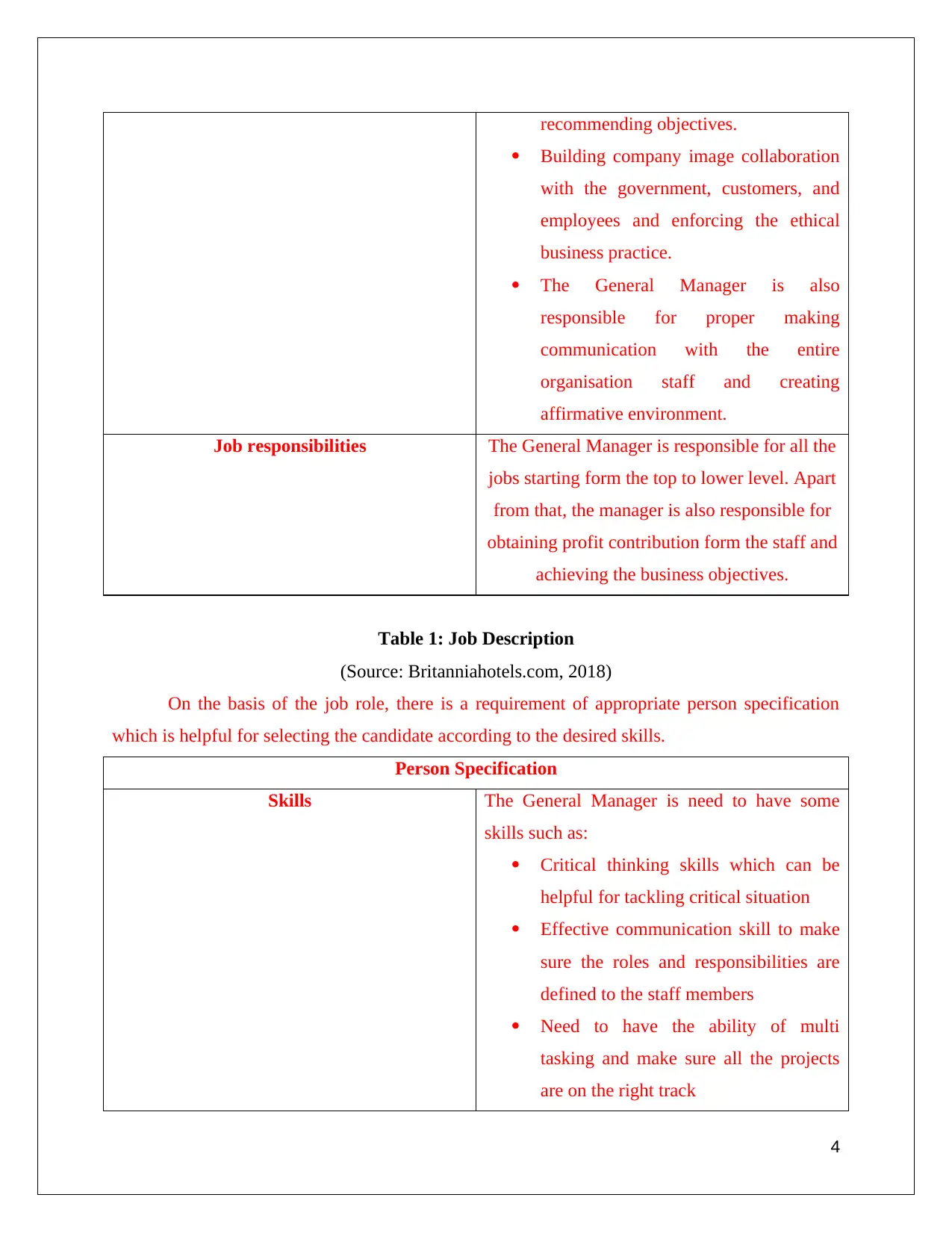
recommending objectives.
Building company image collaboration
with the government, customers, and
employees and enforcing the ethical
business practice.
The General Manager is also
responsible for proper making
communication with the entire
organisation staff and creating
affirmative environment.
Job responsibilities The General Manager is responsible for all the
jobs starting form the top to lower level. Apart
from that, the manager is also responsible for
obtaining profit contribution form the staff and
achieving the business objectives.
Table 1: Job Description
(Source: Britanniahotels.com, 2018)
On the basis of the job role, there is a requirement of appropriate person specification
which is helpful for selecting the candidate according to the desired skills.
Person Specification
Skills The General Manager is need to have some
skills such as:
Critical thinking skills which can be
helpful for tackling critical situation
Effective communication skill to make
sure the roles and responsibilities are
defined to the staff members
Need to have the ability of multi
tasking and make sure all the projects
are on the right track
4
Building company image collaboration
with the government, customers, and
employees and enforcing the ethical
business practice.
The General Manager is also
responsible for proper making
communication with the entire
organisation staff and creating
affirmative environment.
Job responsibilities The General Manager is responsible for all the
jobs starting form the top to lower level. Apart
from that, the manager is also responsible for
obtaining profit contribution form the staff and
achieving the business objectives.
Table 1: Job Description
(Source: Britanniahotels.com, 2018)
On the basis of the job role, there is a requirement of appropriate person specification
which is helpful for selecting the candidate according to the desired skills.
Person Specification
Skills The General Manager is need to have some
skills such as:
Critical thinking skills which can be
helpful for tackling critical situation
Effective communication skill to make
sure the roles and responsibilities are
defined to the staff members
Need to have the ability of multi
tasking and make sure all the projects
are on the right track
4
Secure Best Marks with AI Grader
Need help grading? Try our AI Grader for instant feedback on your assignments.
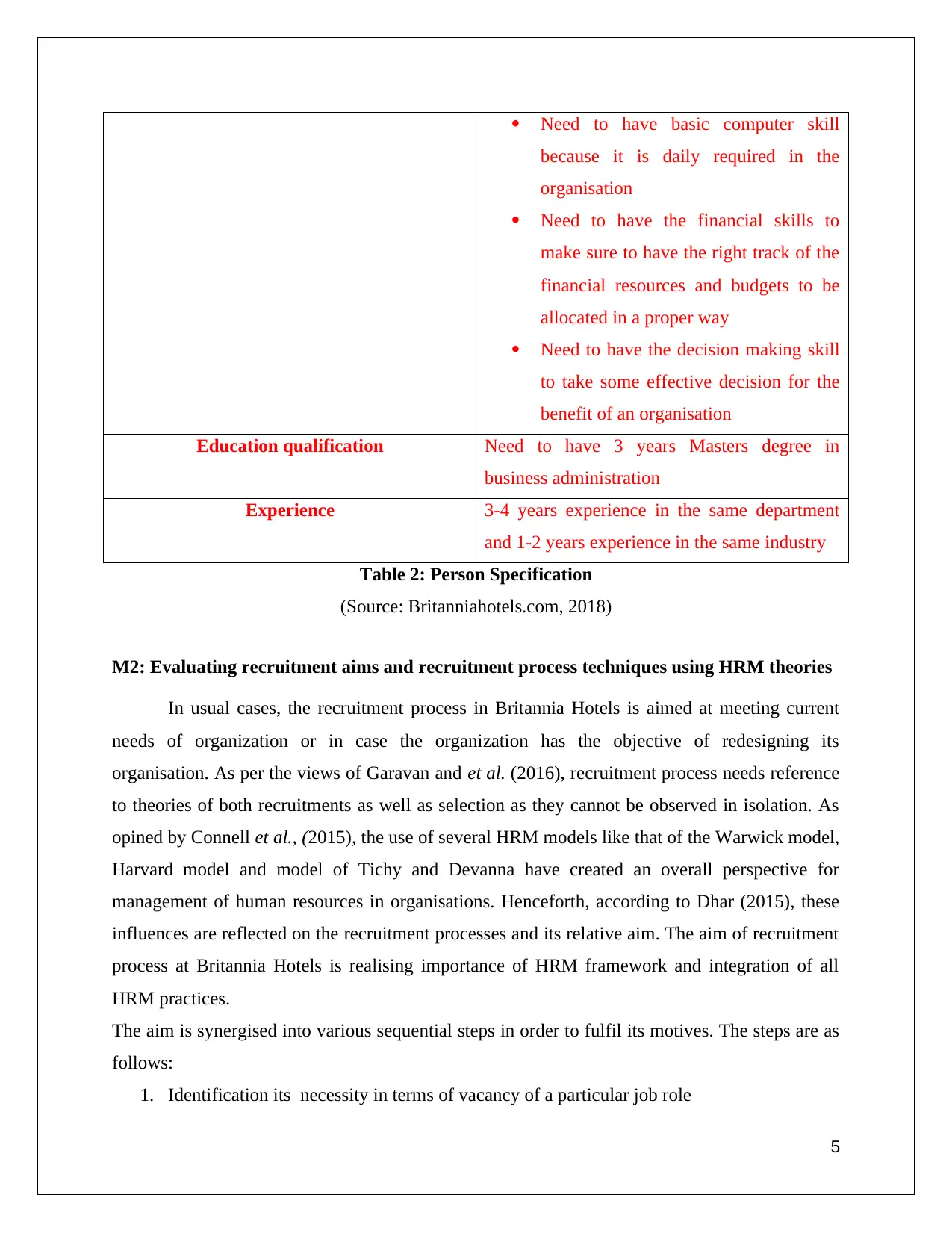
Need to have basic computer skill
because it is daily required in the
organisation
Need to have the financial skills to
make sure to have the right track of the
financial resources and budgets to be
allocated in a proper way
Need to have the decision making skill
to take some effective decision for the
benefit of an organisation
Education qualification Need to have 3 years Masters degree in
business administration
Experience 3-4 years experience in the same department
and 1-2 years experience in the same industry
Table 2: Person Specification
(Source: Britanniahotels.com, 2018)
M2: Evaluating recruitment aims and recruitment process techniques using HRM theories
In usual cases, the recruitment process in Britannia Hotels is aimed at meeting current
needs of organization or in case the organization has the objective of redesigning its
organisation. As per the views of Garavan and et al. (2016), recruitment process needs reference
to theories of both recruitments as well as selection as they cannot be observed in isolation. As
opined by Connell et al., (2015), the use of several HRM models like that of the Warwick model,
Harvard model and model of Tichy and Devanna have created an overall perspective for
management of human resources in organisations. Henceforth, according to Dhar (2015), these
influences are reflected on the recruitment processes and its relative aim. The aim of recruitment
process at Britannia Hotels is realising importance of HRM framework and integration of all
HRM practices.
The aim is synergised into various sequential steps in order to fulfil its motives. The steps are as
follows:
1. Identification its necessity in terms of vacancy of a particular job role
5
because it is daily required in the
organisation
Need to have the financial skills to
make sure to have the right track of the
financial resources and budgets to be
allocated in a proper way
Need to have the decision making skill
to take some effective decision for the
benefit of an organisation
Education qualification Need to have 3 years Masters degree in
business administration
Experience 3-4 years experience in the same department
and 1-2 years experience in the same industry
Table 2: Person Specification
(Source: Britanniahotels.com, 2018)
M2: Evaluating recruitment aims and recruitment process techniques using HRM theories
In usual cases, the recruitment process in Britannia Hotels is aimed at meeting current
needs of organization or in case the organization has the objective of redesigning its
organisation. As per the views of Garavan and et al. (2016), recruitment process needs reference
to theories of both recruitments as well as selection as they cannot be observed in isolation. As
opined by Connell et al., (2015), the use of several HRM models like that of the Warwick model,
Harvard model and model of Tichy and Devanna have created an overall perspective for
management of human resources in organisations. Henceforth, according to Dhar (2015), these
influences are reflected on the recruitment processes and its relative aim. The aim of recruitment
process at Britannia Hotels is realising importance of HRM framework and integration of all
HRM practices.
The aim is synergised into various sequential steps in order to fulfil its motives. The steps are as
follows:
1. Identification its necessity in terms of vacancy of a particular job role
5
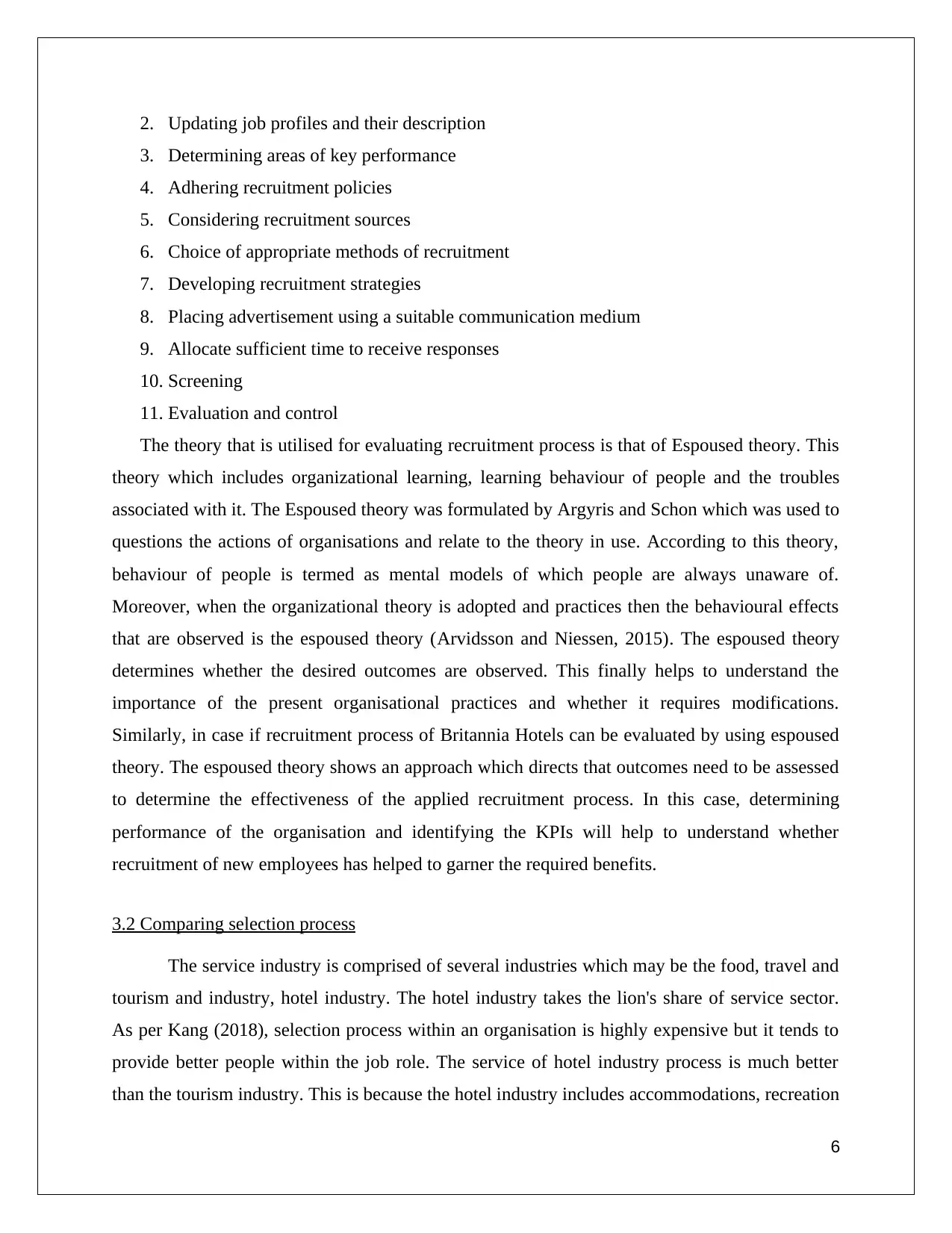
2. Updating job profiles and their description
3. Determining areas of key performance
4. Adhering recruitment policies
5. Considering recruitment sources
6. Choice of appropriate methods of recruitment
7. Developing recruitment strategies
8. Placing advertisement using a suitable communication medium
9. Allocate sufficient time to receive responses
10. Screening
11. Evaluation and control
The theory that is utilised for evaluating recruitment process is that of Espoused theory. This
theory which includes organizational learning, learning behaviour of people and the troubles
associated with it. The Espoused theory was formulated by Argyris and Schon which was used to
questions the actions of organisations and relate to the theory in use. According to this theory,
behaviour of people is termed as mental models of which people are always unaware of.
Moreover, when the organizational theory is adopted and practices then the behavioural effects
that are observed is the espoused theory (Arvidsson and Niessen, 2015). The espoused theory
determines whether the desired outcomes are observed. This finally helps to understand the
importance of the present organisational practices and whether it requires modifications.
Similarly, in case if recruitment process of Britannia Hotels can be evaluated by using espoused
theory. The espoused theory shows an approach which directs that outcomes need to be assessed
to determine the effectiveness of the applied recruitment process. In this case, determining
performance of the organisation and identifying the KPIs will help to understand whether
recruitment of new employees has helped to garner the required benefits.
3.2 Comparing selection process
The service industry is comprised of several industries which may be the food, travel and
tourism and industry, hotel industry. The hotel industry takes the lion's share of service sector.
As per Kang (2018), selection process within an organisation is highly expensive but it tends to
provide better people within the job role. The service of hotel industry process is much better
than the tourism industry. This is because the hotel industry includes accommodations, recreation
6
3. Determining areas of key performance
4. Adhering recruitment policies
5. Considering recruitment sources
6. Choice of appropriate methods of recruitment
7. Developing recruitment strategies
8. Placing advertisement using a suitable communication medium
9. Allocate sufficient time to receive responses
10. Screening
11. Evaluation and control
The theory that is utilised for evaluating recruitment process is that of Espoused theory. This
theory which includes organizational learning, learning behaviour of people and the troubles
associated with it. The Espoused theory was formulated by Argyris and Schon which was used to
questions the actions of organisations and relate to the theory in use. According to this theory,
behaviour of people is termed as mental models of which people are always unaware of.
Moreover, when the organizational theory is adopted and practices then the behavioural effects
that are observed is the espoused theory (Arvidsson and Niessen, 2015). The espoused theory
determines whether the desired outcomes are observed. This finally helps to understand the
importance of the present organisational practices and whether it requires modifications.
Similarly, in case if recruitment process of Britannia Hotels can be evaluated by using espoused
theory. The espoused theory shows an approach which directs that outcomes need to be assessed
to determine the effectiveness of the applied recruitment process. In this case, determining
performance of the organisation and identifying the KPIs will help to understand whether
recruitment of new employees has helped to garner the required benefits.
3.2 Comparing selection process
The service industry is comprised of several industries which may be the food, travel and
tourism and industry, hotel industry. The hotel industry takes the lion's share of service sector.
As per Kang (2018), selection process within an organisation is highly expensive but it tends to
provide better people within the job role. The service of hotel industry process is much better
than the tourism industry. This is because the hotel industry includes accommodations, recreation
6
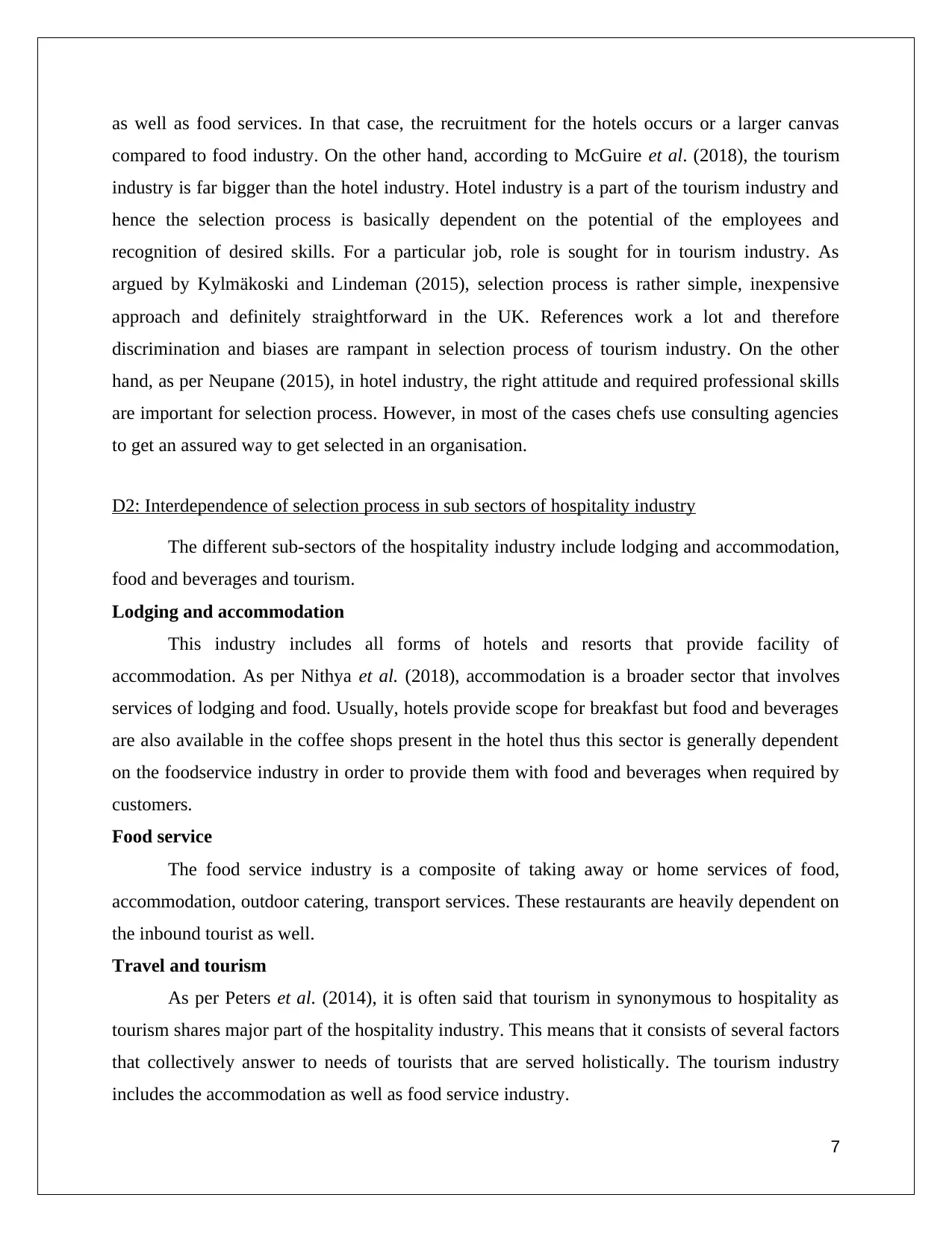
as well as food services. In that case, the recruitment for the hotels occurs or a larger canvas
compared to food industry. On the other hand, according to McGuire et al. (2018), the tourism
industry is far bigger than the hotel industry. Hotel industry is a part of the tourism industry and
hence the selection process is basically dependent on the potential of the employees and
recognition of desired skills. For a particular job, role is sought for in tourism industry. As
argued by Kylmäkoski and Lindeman (2015), selection process is rather simple, inexpensive
approach and definitely straightforward in the UK. References work a lot and therefore
discrimination and biases are rampant in selection process of tourism industry. On the other
hand, as per Neupane (2015), in hotel industry, the right attitude and required professional skills
are important for selection process. However, in most of the cases chefs use consulting agencies
to get an assured way to get selected in an organisation.
D2: Interdependence of selection process in sub sectors of hospitality industry
The different sub-sectors of the hospitality industry include lodging and accommodation,
food and beverages and tourism.
Lodging and accommodation
This industry includes all forms of hotels and resorts that provide facility of
accommodation. As per Nithya et al. (2018), accommodation is a broader sector that involves
services of lodging and food. Usually, hotels provide scope for breakfast but food and beverages
are also available in the coffee shops present in the hotel thus this sector is generally dependent
on the foodservice industry in order to provide them with food and beverages when required by
customers.
Food service
The food service industry is a composite of taking away or home services of food,
accommodation, outdoor catering, transport services. These restaurants are heavily dependent on
the inbound tourist as well.
Travel and tourism
As per Peters et al. (2014), it is often said that tourism in synonymous to hospitality as
tourism shares major part of the hospitality industry. This means that it consists of several factors
that collectively answer to needs of tourists that are served holistically. The tourism industry
includes the accommodation as well as food service industry.
7
compared to food industry. On the other hand, according to McGuire et al. (2018), the tourism
industry is far bigger than the hotel industry. Hotel industry is a part of the tourism industry and
hence the selection process is basically dependent on the potential of the employees and
recognition of desired skills. For a particular job, role is sought for in tourism industry. As
argued by Kylmäkoski and Lindeman (2015), selection process is rather simple, inexpensive
approach and definitely straightforward in the UK. References work a lot and therefore
discrimination and biases are rampant in selection process of tourism industry. On the other
hand, as per Neupane (2015), in hotel industry, the right attitude and required professional skills
are important for selection process. However, in most of the cases chefs use consulting agencies
to get an assured way to get selected in an organisation.
D2: Interdependence of selection process in sub sectors of hospitality industry
The different sub-sectors of the hospitality industry include lodging and accommodation,
food and beverages and tourism.
Lodging and accommodation
This industry includes all forms of hotels and resorts that provide facility of
accommodation. As per Nithya et al. (2018), accommodation is a broader sector that involves
services of lodging and food. Usually, hotels provide scope for breakfast but food and beverages
are also available in the coffee shops present in the hotel thus this sector is generally dependent
on the foodservice industry in order to provide them with food and beverages when required by
customers.
Food service
The food service industry is a composite of taking away or home services of food,
accommodation, outdoor catering, transport services. These restaurants are heavily dependent on
the inbound tourist as well.
Travel and tourism
As per Peters et al. (2014), it is often said that tourism in synonymous to hospitality as
tourism shares major part of the hospitality industry. This means that it consists of several factors
that collectively answer to needs of tourists that are served holistically. The tourism industry
includes the accommodation as well as food service industry.
7
Paraphrase This Document
Need a fresh take? Get an instant paraphrase of this document with our AI Paraphraser
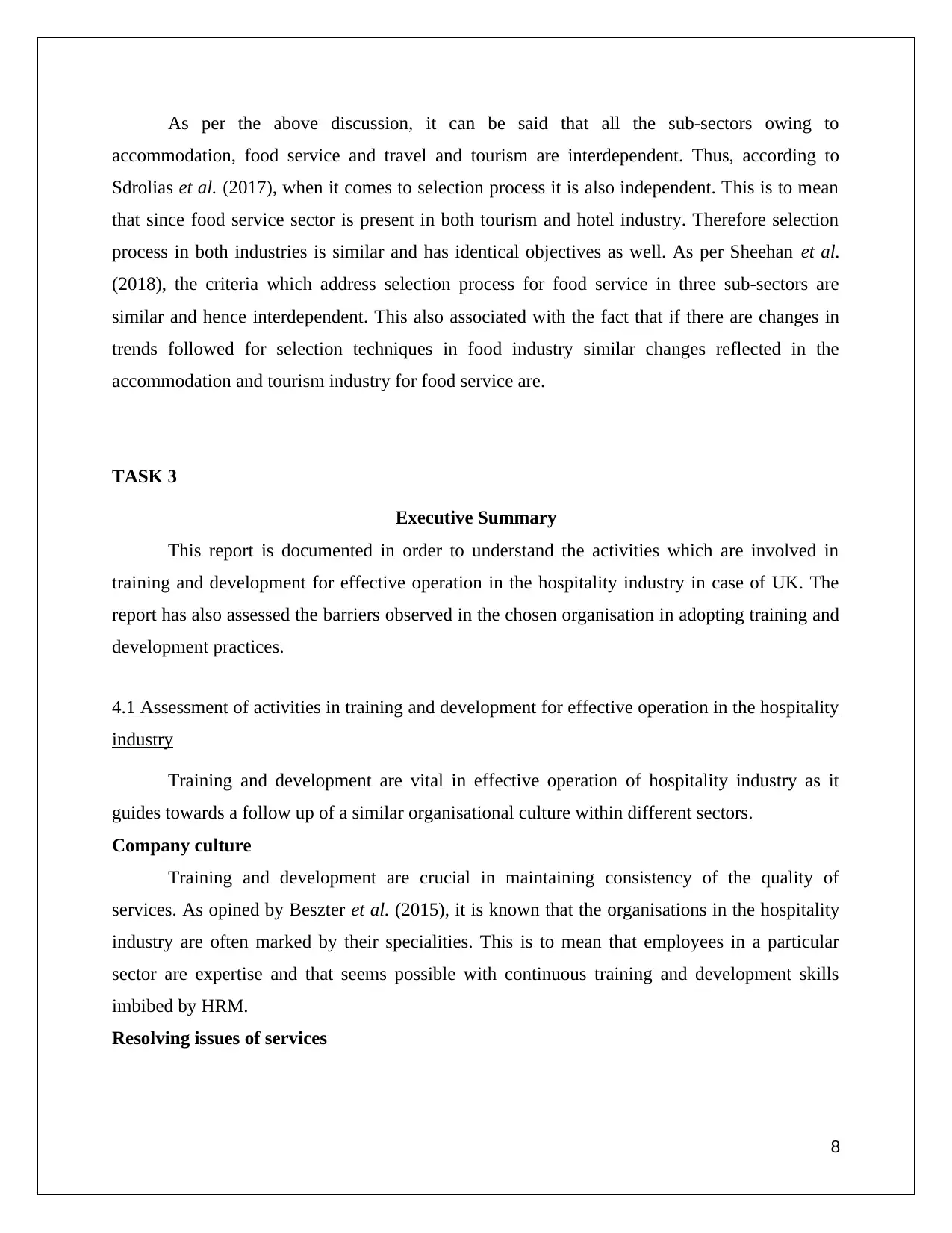
As per the above discussion, it can be said that all the sub-sectors owing to
accommodation, food service and travel and tourism are interdependent. Thus, according to
Sdrolias et al. (2017), when it comes to selection process it is also independent. This is to mean
that since food service sector is present in both tourism and hotel industry. Therefore selection
process in both industries is similar and has identical objectives as well. As per Sheehan et al.
(2018), the criteria which address selection process for food service in three sub-sectors are
similar and hence interdependent. This also associated with the fact that if there are changes in
trends followed for selection techniques in food industry similar changes reflected in the
accommodation and tourism industry for food service are.
TASK 3
Executive Summary
This report is documented in order to understand the activities which are involved in
training and development for effective operation in the hospitality industry in case of UK. The
report has also assessed the barriers observed in the chosen organisation in adopting training and
development practices.
4.1 Assessment of activities in training and development for effective operation in the hospitality
industry
Training and development are vital in effective operation of hospitality industry as it
guides towards a follow up of a similar organisational culture within different sectors.
Company culture
Training and development are crucial in maintaining consistency of the quality of
services. As opined by Beszter et al. (2015), it is known that the organisations in the hospitality
industry are often marked by their specialities. This is to mean that employees in a particular
sector are expertise and that seems possible with continuous training and development skills
imbibed by HRM.
Resolving issues of services
8
accommodation, food service and travel and tourism are interdependent. Thus, according to
Sdrolias et al. (2017), when it comes to selection process it is also independent. This is to mean
that since food service sector is present in both tourism and hotel industry. Therefore selection
process in both industries is similar and has identical objectives as well. As per Sheehan et al.
(2018), the criteria which address selection process for food service in three sub-sectors are
similar and hence interdependent. This also associated with the fact that if there are changes in
trends followed for selection techniques in food industry similar changes reflected in the
accommodation and tourism industry for food service are.
TASK 3
Executive Summary
This report is documented in order to understand the activities which are involved in
training and development for effective operation in the hospitality industry in case of UK. The
report has also assessed the barriers observed in the chosen organisation in adopting training and
development practices.
4.1 Assessment of activities in training and development for effective operation in the hospitality
industry
Training and development are vital in effective operation of hospitality industry as it
guides towards a follow up of a similar organisational culture within different sectors.
Company culture
Training and development are crucial in maintaining consistency of the quality of
services. As opined by Beszter et al. (2015), it is known that the organisations in the hospitality
industry are often marked by their specialities. This is to mean that employees in a particular
sector are expertise and that seems possible with continuous training and development skills
imbibed by HRM.
Resolving issues of services
8
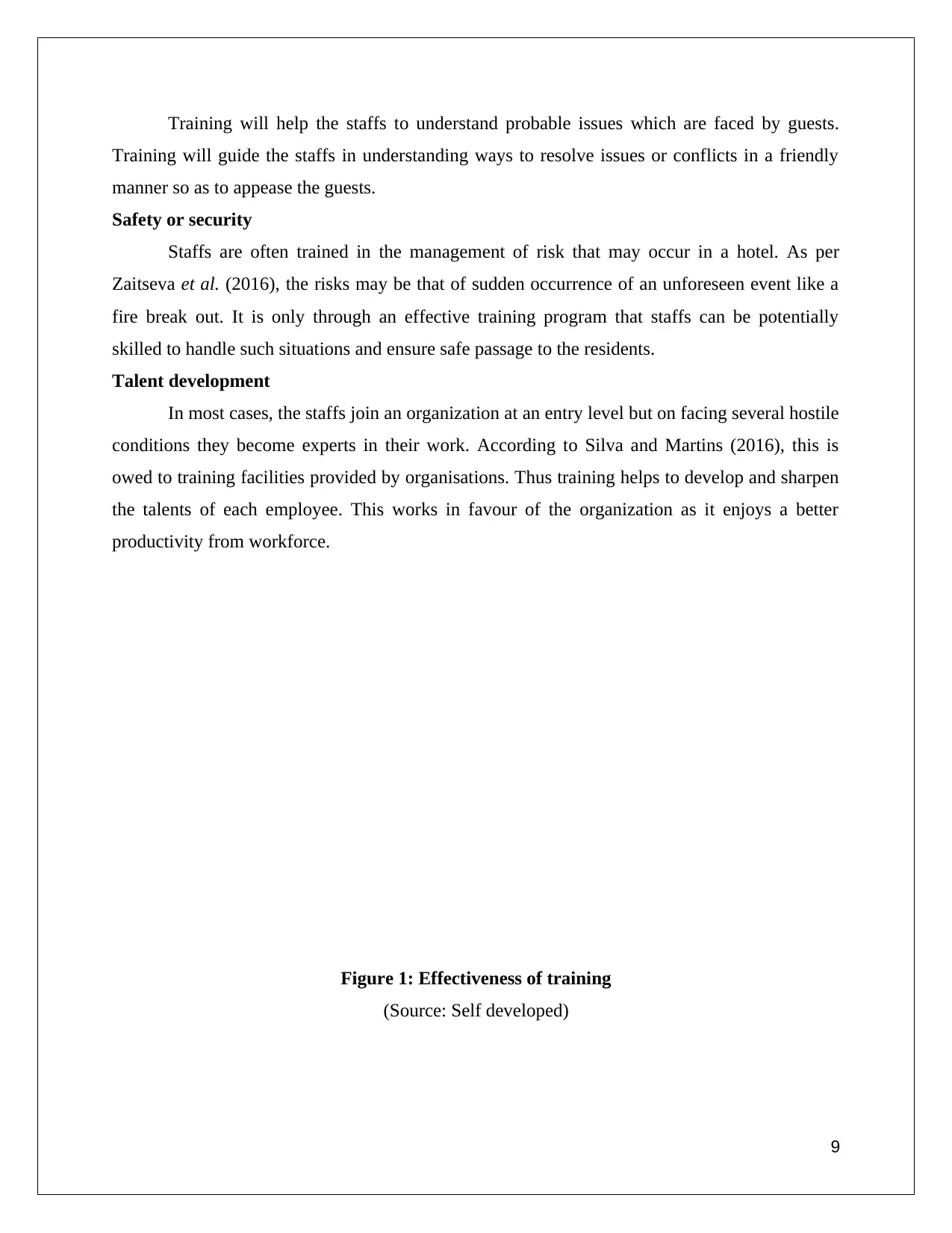
Training will help the staffs to understand probable issues which are faced by guests.
Training will guide the staffs in understanding ways to resolve issues or conflicts in a friendly
manner so as to appease the guests.
Safety or security
Staffs are often trained in the management of risk that may occur in a hotel. As per
Zaitseva et al. (2016), the risks may be that of sudden occurrence of an unforeseen event like a
fire break out. It is only through an effective training program that staffs can be potentially
skilled to handle such situations and ensure safe passage to the residents.
Talent development
In most cases, the staffs join an organization at an entry level but on facing several hostile
conditions they become experts in their work. According to Silva and Martins (2016), this is
owed to training facilities provided by organisations. Thus training helps to develop and sharpen
the talents of each employee. This works in favour of the organization as it enjoys a better
productivity from workforce.
Figure 1: Effectiveness of training
(Source: Self developed)
9
Training will guide the staffs in understanding ways to resolve issues or conflicts in a friendly
manner so as to appease the guests.
Safety or security
Staffs are often trained in the management of risk that may occur in a hotel. As per
Zaitseva et al. (2016), the risks may be that of sudden occurrence of an unforeseen event like a
fire break out. It is only through an effective training program that staffs can be potentially
skilled to handle such situations and ensure safe passage to the residents.
Talent development
In most cases, the staffs join an organization at an entry level but on facing several hostile
conditions they become experts in their work. According to Silva and Martins (2016), this is
owed to training facilities provided by organisations. Thus training helps to develop and sharpen
the talents of each employee. This works in favour of the organization as it enjoys a better
productivity from workforce.
Figure 1: Effectiveness of training
(Source: Self developed)
9
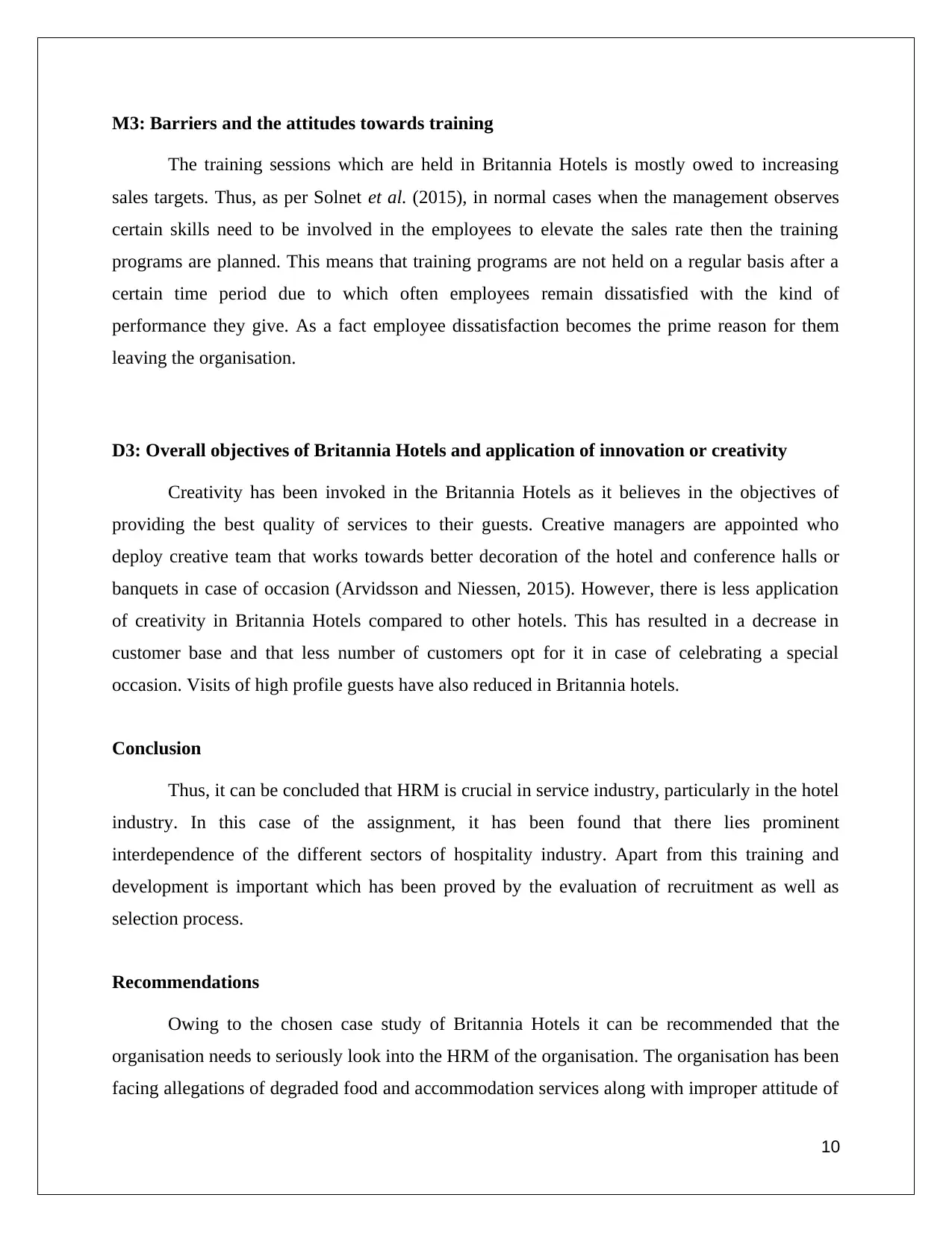
M3: Barriers and the attitudes towards training
The training sessions which are held in Britannia Hotels is mostly owed to increasing
sales targets. Thus, as per Solnet et al. (2015), in normal cases when the management observes
certain skills need to be involved in the employees to elevate the sales rate then the training
programs are planned. This means that training programs are not held on a regular basis after a
certain time period due to which often employees remain dissatisfied with the kind of
performance they give. As a fact employee dissatisfaction becomes the prime reason for them
leaving the organisation.
D3: Overall objectives of Britannia Hotels and application of innovation or creativity
Creativity has been invoked in the Britannia Hotels as it believes in the objectives of
providing the best quality of services to their guests. Creative managers are appointed who
deploy creative team that works towards better decoration of the hotel and conference halls or
banquets in case of occasion (Arvidsson and Niessen, 2015). However, there is less application
of creativity in Britannia Hotels compared to other hotels. This has resulted in a decrease in
customer base and that less number of customers opt for it in case of celebrating a special
occasion. Visits of high profile guests have also reduced in Britannia hotels.
Conclusion
Thus, it can be concluded that HRM is crucial in service industry, particularly in the hotel
industry. In this case of the assignment, it has been found that there lies prominent
interdependence of the different sectors of hospitality industry. Apart from this training and
development is important which has been proved by the evaluation of recruitment as well as
selection process.
Recommendations
Owing to the chosen case study of Britannia Hotels it can be recommended that the
organisation needs to seriously look into the HRM of the organisation. The organisation has been
facing allegations of degraded food and accommodation services along with improper attitude of
10
The training sessions which are held in Britannia Hotels is mostly owed to increasing
sales targets. Thus, as per Solnet et al. (2015), in normal cases when the management observes
certain skills need to be involved in the employees to elevate the sales rate then the training
programs are planned. This means that training programs are not held on a regular basis after a
certain time period due to which often employees remain dissatisfied with the kind of
performance they give. As a fact employee dissatisfaction becomes the prime reason for them
leaving the organisation.
D3: Overall objectives of Britannia Hotels and application of innovation or creativity
Creativity has been invoked in the Britannia Hotels as it believes in the objectives of
providing the best quality of services to their guests. Creative managers are appointed who
deploy creative team that works towards better decoration of the hotel and conference halls or
banquets in case of occasion (Arvidsson and Niessen, 2015). However, there is less application
of creativity in Britannia Hotels compared to other hotels. This has resulted in a decrease in
customer base and that less number of customers opt for it in case of celebrating a special
occasion. Visits of high profile guests have also reduced in Britannia hotels.
Conclusion
Thus, it can be concluded that HRM is crucial in service industry, particularly in the hotel
industry. In this case of the assignment, it has been found that there lies prominent
interdependence of the different sectors of hospitality industry. Apart from this training and
development is important which has been proved by the evaluation of recruitment as well as
selection process.
Recommendations
Owing to the chosen case study of Britannia Hotels it can be recommended that the
organisation needs to seriously look into the HRM of the organisation. The organisation has been
facing allegations of degraded food and accommodation services along with improper attitude of
10
Secure Best Marks with AI Grader
Need help grading? Try our AI Grader for instant feedback on your assignments.
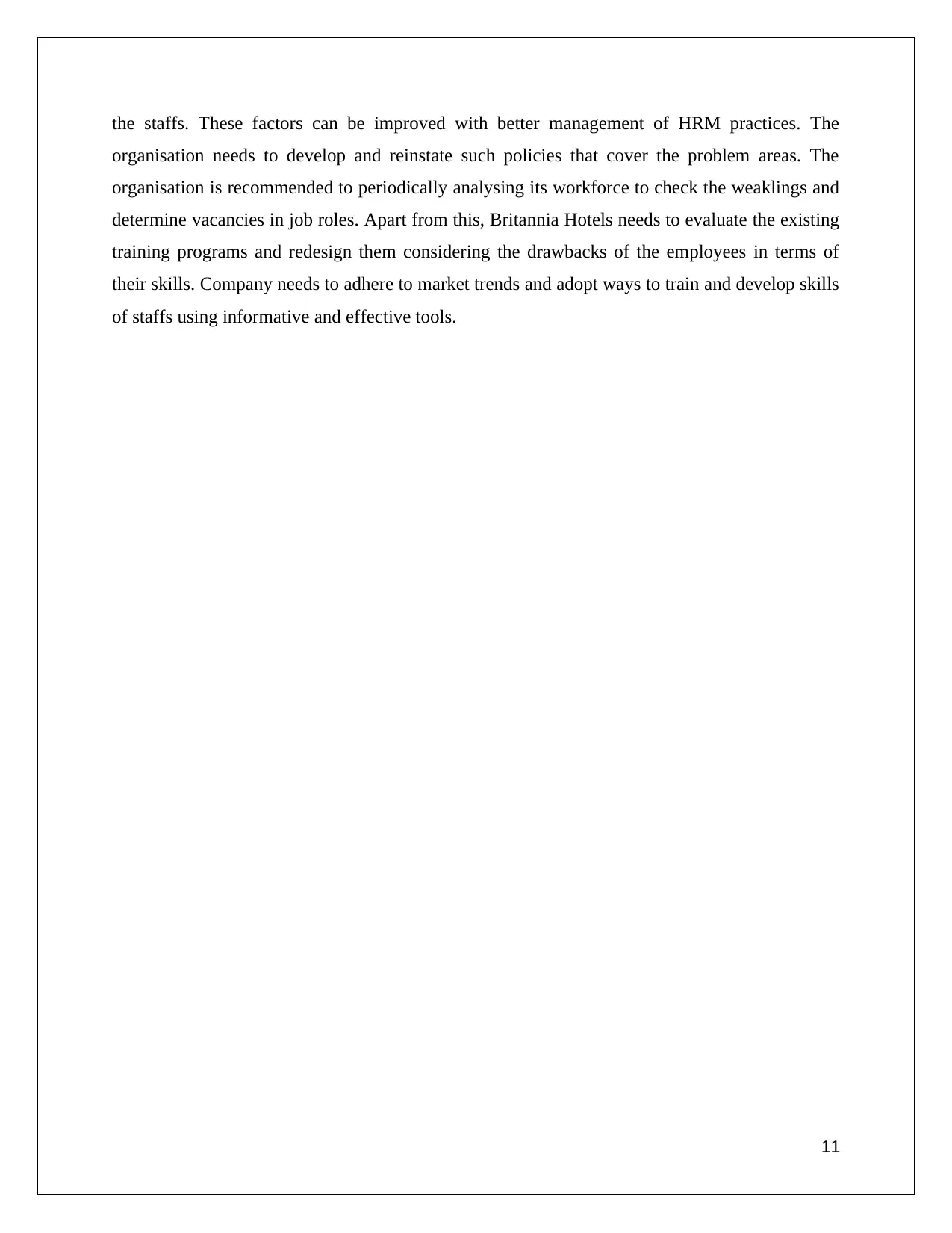
the staffs. These factors can be improved with better management of HRM practices. The
organisation needs to develop and reinstate such policies that cover the problem areas. The
organisation is recommended to periodically analysing its workforce to check the weaklings and
determine vacancies in job roles. Apart from this, Britannia Hotels needs to evaluate the existing
training programs and redesign them considering the drawbacks of the employees in terms of
their skills. Company needs to adhere to market trends and adopt ways to train and develop skills
of staffs using informative and effective tools.
11
organisation needs to develop and reinstate such policies that cover the problem areas. The
organisation is recommended to periodically analysing its workforce to check the weaklings and
determine vacancies in job roles. Apart from this, Britannia Hotels needs to evaluate the existing
training programs and redesign them considering the drawbacks of the employees in terms of
their skills. Company needs to adhere to market trends and adopt ways to train and develop skills
of staffs using informative and effective tools.
11
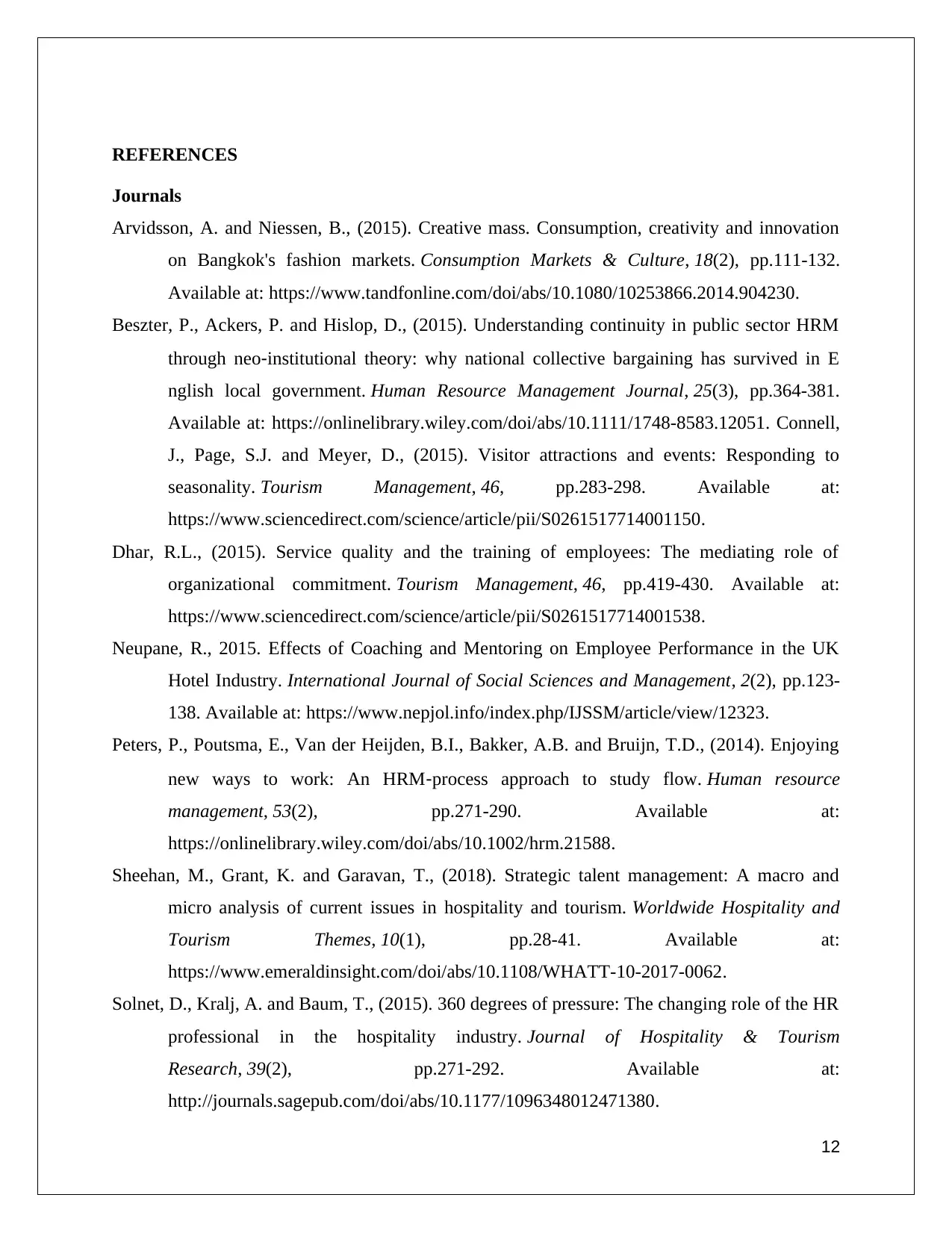
REFERENCES
Journals
Arvidsson, A. and Niessen, B., (2015). Creative mass. Consumption, creativity and innovation
on Bangkok's fashion markets. Consumption Markets & Culture, 18(2), pp.111-132.
Available at: https://www.tandfonline.com/doi/abs/10.1080/10253866.2014.904230.
Beszter, P., Ackers, P. and Hislop, D., (2015). Understanding continuity in public sector HRM
through neo‐institutional theory: why national collective bargaining has survived in E
nglish local government. Human Resource Management Journal, 25(3), pp.364-381.
Available at: https://onlinelibrary.wiley.com/doi/abs/10.1111/1748-8583.12051. Connell,
J., Page, S.J. and Meyer, D., (2015). Visitor attractions and events: Responding to
seasonality. Tourism Management, 46, pp.283-298. Available at:
https://www.sciencedirect.com/science/article/pii/S0261517714001150.
Dhar, R.L., (2015). Service quality and the training of employees: The mediating role of
organizational commitment. Tourism Management, 46, pp.419-430. Available at:
https://www.sciencedirect.com/science/article/pii/S0261517714001538.
Neupane, R., 2015. Effects of Coaching and Mentoring on Employee Performance in the UK
Hotel Industry. International Journal of Social Sciences and Management, 2(2), pp.123-
138. Available at: https://www.nepjol.info/index.php/IJSSM/article/view/12323.
Peters, P., Poutsma, E., Van der Heijden, B.I., Bakker, A.B. and Bruijn, T.D., (2014). Enjoying
new ways to work: An HRM‐process approach to study flow. Human resource
management, 53(2), pp.271-290. Available at:
https://onlinelibrary.wiley.com/doi/abs/10.1002/hrm.21588.
Sheehan, M., Grant, K. and Garavan, T., (2018). Strategic talent management: A macro and
micro analysis of current issues in hospitality and tourism. Worldwide Hospitality and
Tourism Themes, 10(1), pp.28-41. Available at:
https://www.emeraldinsight.com/doi/abs/10.1108/WHATT-10-2017-0062.
Solnet, D., Kralj, A. and Baum, T., (2015). 360 degrees of pressure: The changing role of the HR
professional in the hospitality industry. Journal of Hospitality & Tourism
Research, 39(2), pp.271-292. Available at:
http://journals.sagepub.com/doi/abs/10.1177/1096348012471380.
12
Journals
Arvidsson, A. and Niessen, B., (2015). Creative mass. Consumption, creativity and innovation
on Bangkok's fashion markets. Consumption Markets & Culture, 18(2), pp.111-132.
Available at: https://www.tandfonline.com/doi/abs/10.1080/10253866.2014.904230.
Beszter, P., Ackers, P. and Hislop, D., (2015). Understanding continuity in public sector HRM
through neo‐institutional theory: why national collective bargaining has survived in E
nglish local government. Human Resource Management Journal, 25(3), pp.364-381.
Available at: https://onlinelibrary.wiley.com/doi/abs/10.1111/1748-8583.12051. Connell,
J., Page, S.J. and Meyer, D., (2015). Visitor attractions and events: Responding to
seasonality. Tourism Management, 46, pp.283-298. Available at:
https://www.sciencedirect.com/science/article/pii/S0261517714001150.
Dhar, R.L., (2015). Service quality and the training of employees: The mediating role of
organizational commitment. Tourism Management, 46, pp.419-430. Available at:
https://www.sciencedirect.com/science/article/pii/S0261517714001538.
Neupane, R., 2015. Effects of Coaching and Mentoring on Employee Performance in the UK
Hotel Industry. International Journal of Social Sciences and Management, 2(2), pp.123-
138. Available at: https://www.nepjol.info/index.php/IJSSM/article/view/12323.
Peters, P., Poutsma, E., Van der Heijden, B.I., Bakker, A.B. and Bruijn, T.D., (2014). Enjoying
new ways to work: An HRM‐process approach to study flow. Human resource
management, 53(2), pp.271-290. Available at:
https://onlinelibrary.wiley.com/doi/abs/10.1002/hrm.21588.
Sheehan, M., Grant, K. and Garavan, T., (2018). Strategic talent management: A macro and
micro analysis of current issues in hospitality and tourism. Worldwide Hospitality and
Tourism Themes, 10(1), pp.28-41. Available at:
https://www.emeraldinsight.com/doi/abs/10.1108/WHATT-10-2017-0062.
Solnet, D., Kralj, A. and Baum, T., (2015). 360 degrees of pressure: The changing role of the HR
professional in the hospitality industry. Journal of Hospitality & Tourism
Research, 39(2), pp.271-292. Available at:
http://journals.sagepub.com/doi/abs/10.1177/1096348012471380.
12
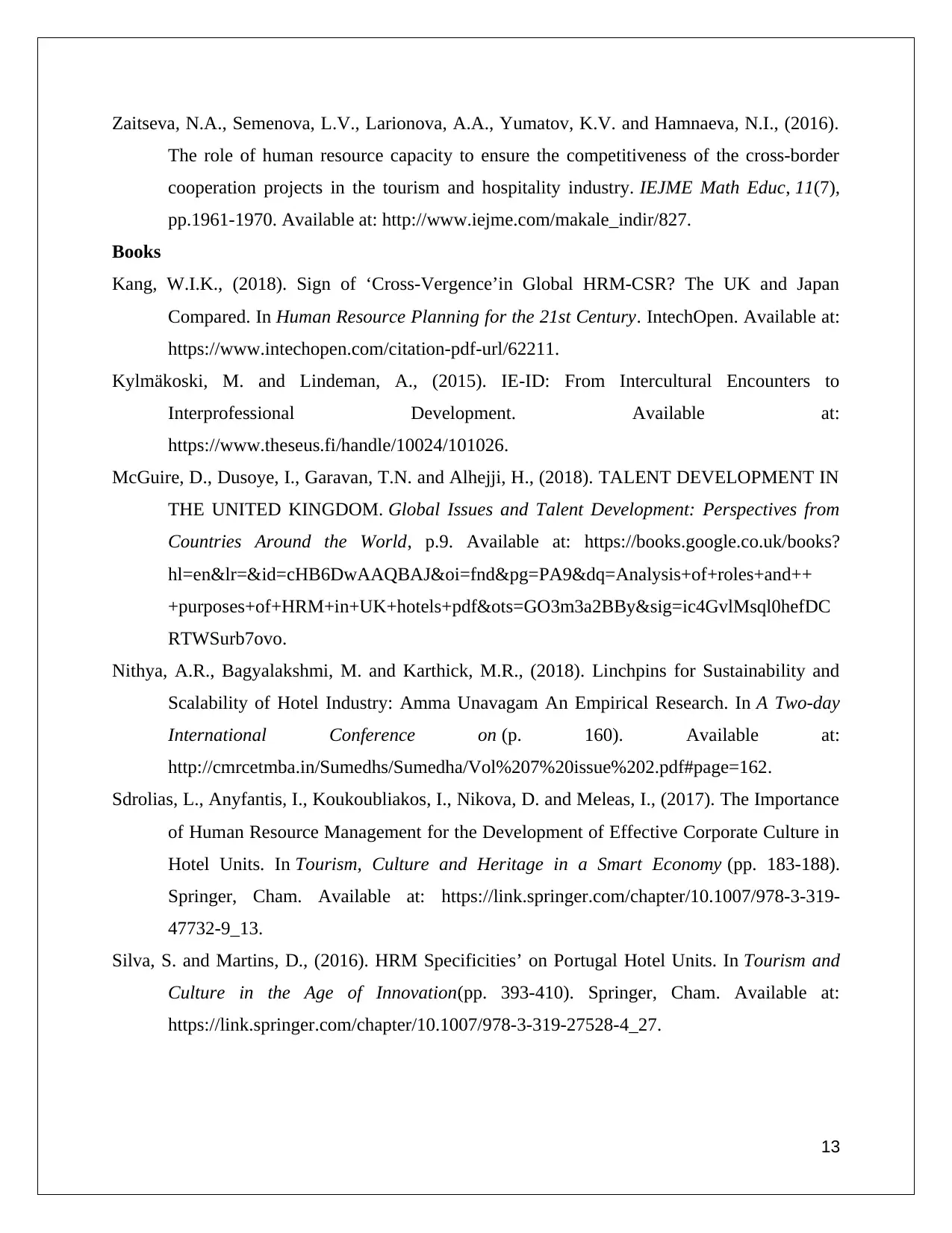
Zaitseva, N.A., Semenova, L.V., Larionova, A.A., Yumatov, K.V. and Hamnaeva, N.I., (2016).
The role of human resource capacity to ensure the competitiveness of the cross-border
cooperation projects in the tourism and hospitality industry. IEJME Math Educ, 11(7),
pp.1961-1970. Available at: http://www.iejme.com/makale_indir/827.
Books
Kang, W.I.K., (2018). Sign of ‘Cross-Vergence’in Global HRM-CSR? The UK and Japan
Compared. In Human Resource Planning for the 21st Century. IntechOpen. Available at:
https://www.intechopen.com/citation-pdf-url/62211.
Kylmäkoski, M. and Lindeman, A., (2015). IE-ID: From Intercultural Encounters to
Interprofessional Development. Available at:
https://www.theseus.fi/handle/10024/101026.
McGuire, D., Dusoye, I., Garavan, T.N. and Alhejji, H., (2018). TALENT DEVELOPMENT IN
THE UNITED KINGDOM. Global Issues and Talent Development: Perspectives from
Countries Around the World, p.9. Available at: https://books.google.co.uk/books?
hl=en&lr=&id=cHB6DwAAQBAJ&oi=fnd&pg=PA9&dq=Analysis+of+roles+and++
+purposes+of+HRM+in+UK+hotels+pdf&ots=GO3m3a2BBy&sig=ic4GvlMsql0hefDC
RTWSurb7ovo.
Nithya, A.R., Bagyalakshmi, M. and Karthick, M.R., (2018). Linchpins for Sustainability and
Scalability of Hotel Industry: Amma Unavagam An Empirical Research. In A Two-day
International Conference on (p. 160). Available at:
http://cmrcetmba.in/Sumedhs/Sumedha/Vol%207%20issue%202.pdf#page=162.
Sdrolias, L., Anyfantis, I., Koukoubliakos, I., Nikova, D. and Meleas, I., (2017). The Importance
of Human Resource Management for the Development of Effective Corporate Culture in
Hotel Units. In Tourism, Culture and Heritage in a Smart Economy (pp. 183-188).
Springer, Cham. Available at: https://link.springer.com/chapter/10.1007/978-3-319-
47732-9_13.
Silva, S. and Martins, D., (2016). HRM Specificities’ on Portugal Hotel Units. In Tourism and
Culture in the Age of Innovation(pp. 393-410). Springer, Cham. Available at:
https://link.springer.com/chapter/10.1007/978-3-319-27528-4_27.
13
The role of human resource capacity to ensure the competitiveness of the cross-border
cooperation projects in the tourism and hospitality industry. IEJME Math Educ, 11(7),
pp.1961-1970. Available at: http://www.iejme.com/makale_indir/827.
Books
Kang, W.I.K., (2018). Sign of ‘Cross-Vergence’in Global HRM-CSR? The UK and Japan
Compared. In Human Resource Planning for the 21st Century. IntechOpen. Available at:
https://www.intechopen.com/citation-pdf-url/62211.
Kylmäkoski, M. and Lindeman, A., (2015). IE-ID: From Intercultural Encounters to
Interprofessional Development. Available at:
https://www.theseus.fi/handle/10024/101026.
McGuire, D., Dusoye, I., Garavan, T.N. and Alhejji, H., (2018). TALENT DEVELOPMENT IN
THE UNITED KINGDOM. Global Issues and Talent Development: Perspectives from
Countries Around the World, p.9. Available at: https://books.google.co.uk/books?
hl=en&lr=&id=cHB6DwAAQBAJ&oi=fnd&pg=PA9&dq=Analysis+of+roles+and++
+purposes+of+HRM+in+UK+hotels+pdf&ots=GO3m3a2BBy&sig=ic4GvlMsql0hefDC
RTWSurb7ovo.
Nithya, A.R., Bagyalakshmi, M. and Karthick, M.R., (2018). Linchpins for Sustainability and
Scalability of Hotel Industry: Amma Unavagam An Empirical Research. In A Two-day
International Conference on (p. 160). Available at:
http://cmrcetmba.in/Sumedhs/Sumedha/Vol%207%20issue%202.pdf#page=162.
Sdrolias, L., Anyfantis, I., Koukoubliakos, I., Nikova, D. and Meleas, I., (2017). The Importance
of Human Resource Management for the Development of Effective Corporate Culture in
Hotel Units. In Tourism, Culture and Heritage in a Smart Economy (pp. 183-188).
Springer, Cham. Available at: https://link.springer.com/chapter/10.1007/978-3-319-
47732-9_13.
Silva, S. and Martins, D., (2016). HRM Specificities’ on Portugal Hotel Units. In Tourism and
Culture in the Age of Innovation(pp. 393-410). Springer, Cham. Available at:
https://link.springer.com/chapter/10.1007/978-3-319-27528-4_27.
13
1 out of 13
Related Documents
Your All-in-One AI-Powered Toolkit for Academic Success.
+13062052269
info@desklib.com
Available 24*7 on WhatsApp / Email
![[object Object]](/_next/static/media/star-bottom.7253800d.svg)
Unlock your academic potential
© 2024 | Zucol Services PVT LTD | All rights reserved.




